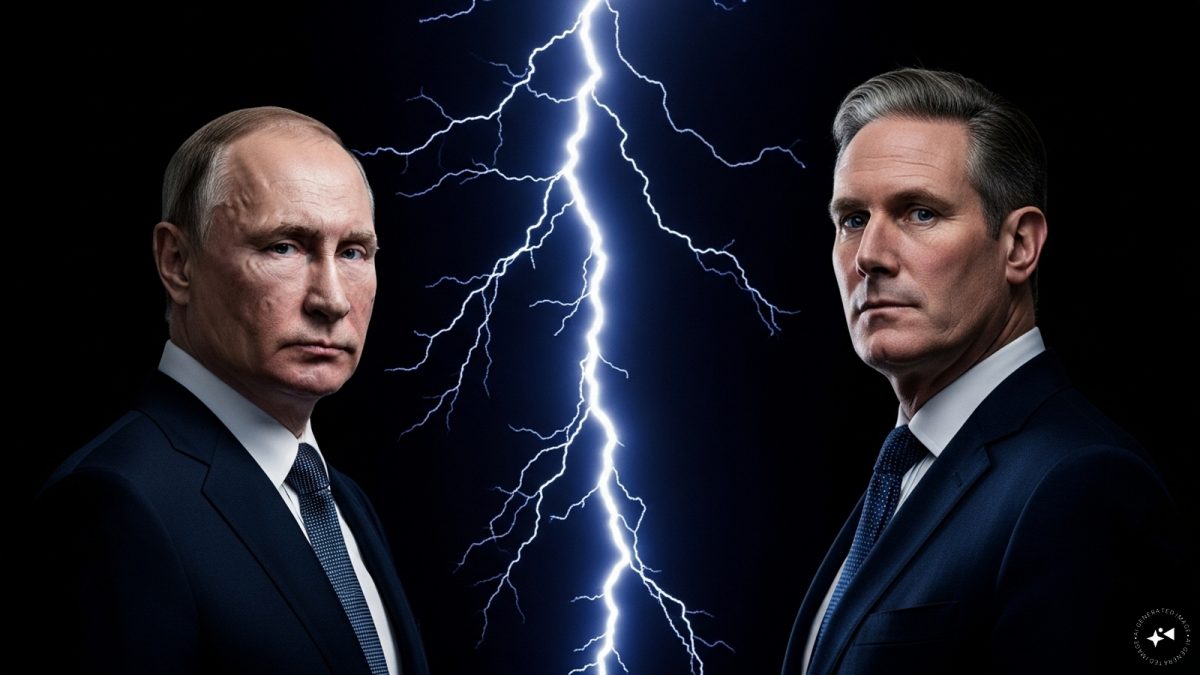In a striking shift that reflects Moscow’s recalibration of its threat perceptions, driven by US unpredictability under Donald Trump and UK’s assertive support for Ukraine, Britain has now replaced Washington as the Kremlin’s primary Western adversary. Once focused squarely on the United States, Russian rhetoric and actions increasingly single out Britain, accusing it of espionage, sabotage and direct interference in regional conflicts.
From US to UK: A deliberate turn in Russia’s rhetoric
Long the focus of Russian ire, the United States is increasingly taking a back seat in the Kremlin’s villain narrative. As Russian officials seek a more antagonistic “Western” adversary, Britain has stepped into that role. Russia has been accusing the UK of everything from drone attacks and intelligence operations to sabotage of infrastructure very frequently, allegations that the British government strongly denies.
The shift is partly strategic. With signs of a thaw in US–Russia relations under Donald Trump who has pushed for rapprochement, Moscow appears to be redirecting its antagonism toward a traditional rival more willing to confront it militarily: Britain.
Adding to the recalibration is a growing belief in Moscow that the United States is no longer a dependable ally. Fiona Hill, a senior figure in the UK’s 2025 Strategic Defence Review and a former US National Security Council Russia adviser, warned that Russia is increasingly treating Britain as its primary adversary.
Hill argued that under Trump, the US has become “unpredictable,” reducing its reliability for European allies. This has left the UK caught between an increasingly aggressive Russia and a transactional, unpredictable US, according to her analysis.
Frozen Russian assets and spying claims
United Kingdom along with European allies has been very pro-active in using frozen Russian assets to quickly fund support for Kyiv to increase the pressure on Vladimir Putin. British Prime Minister Keir Starmer hosted “Coalition of the Willing” talks in London last month with President Volodymyr Zelenskyy and other leaders, discussing a range of efforts including taking Russian oil and gas off the global market and giving Kyiv more long-range missiles.
The deterioration in UK–Russia ties reached a new level in March 2025, when Moscow expelled two British diplomats, accusing them of espionage. The Kremlin claimed they provided false information to enter Russia and conducted intelligence-gathering work undermining national security. London swiftly rejected the accusations as “malicious and baseless.”
Quick Reads
View AllThe expulsions occurred at a time when Russia was simultaneously negotiating to restore diplomatic ties with the United States, a stark signal that Moscow’s focus had shifted decisively to the UK.
Historic rivalry reawakens in modern geopolitics
Analysts note that the UK–Russia animosity draws on deep historical currents. From the era of the “Great Game” to Cold War posturing, Moscow has long viewed Britain as a resilient and strategically significant foe.
With London now providing strong military and diplomatic support for Ukraine, Putin’s government is intensifying its anti-British narrative. The UK is portrayed in Russian media not just as a meddler but as a formidable geopolitical force driving the West’s opposition to Moscow.
Recently, Russia has delivered a sharp rebuke to the United Kingdom, warning it against meddling in ongoing attempts to broker a ceasefire in Ukraine. Moscow directly accused London of disrupting peace efforts being pursued jointly by Russia and the United States.
The Kremlin condemned recent UK suggestions including the idea of sending Western troops following a truce, calling them irresponsible and hazardous. Russian officials described the proposals as dangerous geopolitical posturing, warning that such actions risk heightening tensions rather than helping efforts to restore calm and pursue a lasting peace.
Implications for future conflict and global alliances
The rise of Britain as Russia’s villain of choice represents more than propaganda, it may reshape how geopolitical contestation unfolds. As Moscow refocuses its hostility on the UK, it could seek to fracture unity within NATO and drive a wedge between its own adversaries.
Meanwhile, Britain is being pushed to redefine its security posture. Hill and other defence experts argue that this new geopolitical reality demands greater national cohesion, resilience and a lessened reliance on US military guarantees.
This transformation in Russia’s threat perceptions could also have ramifications for broader global alliances. If Moscow increasingly regards the UK as its primary Western adversary, there may be consequences for how NATO, Europe, and other partners align their defence and diplomatic strategies in response.
With inputs from agencies
)